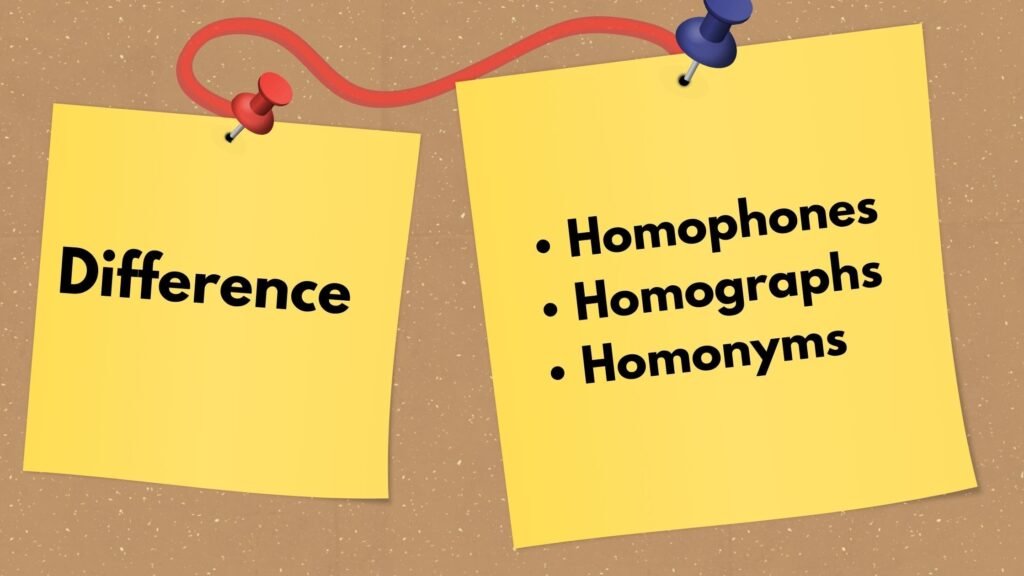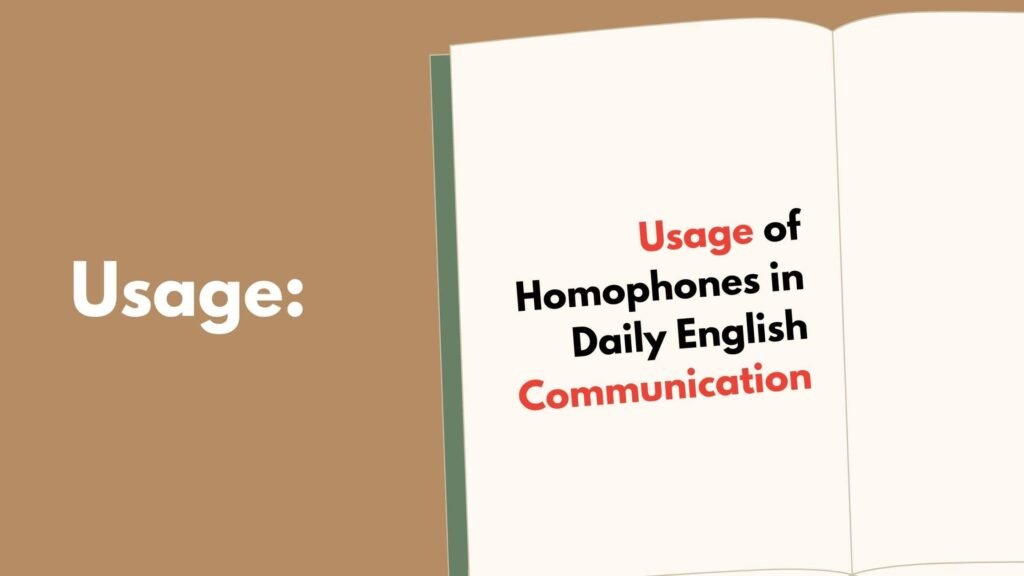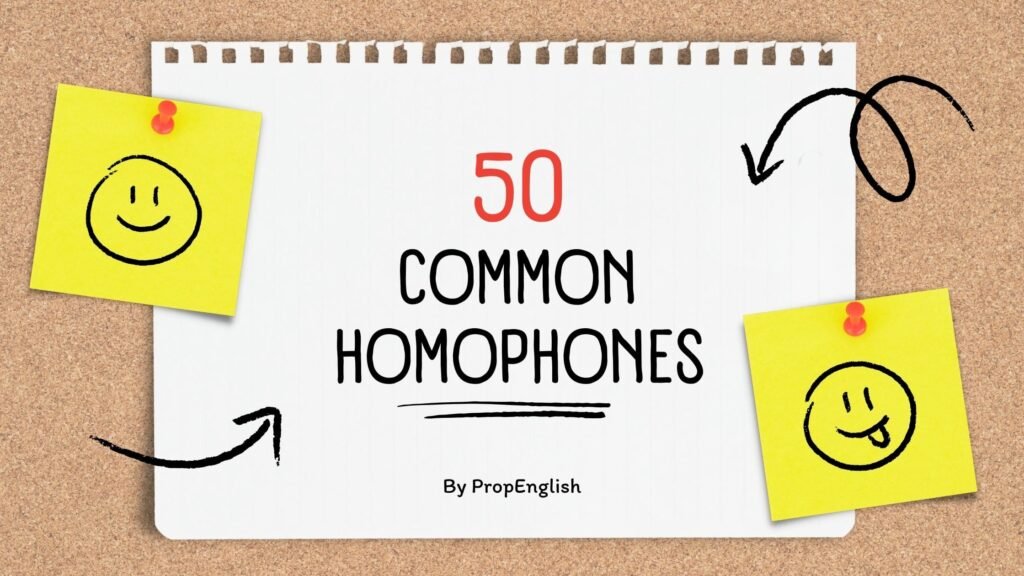Homophones are a fascinating aspect of the English language that often leads to confusion for many learners. In this blog post, we’ll break down the meaning of homophones, explore the principles behind them, and provide practical tips on how to recognize them effortlessly.
Meaning of Homophones:
There are many words in the English language that sound the same but have different meanings and spellings; we call these words homophones. Despite sharing a similar pronunciation, these words can have entirely distinct definitions, making them a source of amusement and occasional perplexity in language use.
Principle of Homophones in English:
The principle of homophones revolves around their auditory similarity rather than their visual resemblance. These words may look entirely different when written, but when spoken, they create a similar or identical sound. This unique linguistic phenomenon adds depth and complexity to the English language.
How to Recognize Homophones:
- Listen Carefully: Pay close attention to the way words are pronounced, as homophones rely on their auditory similarity.
- Context is Key: Consider the context in which the words are used. Understanding the meaning of the sentence can often help differentiate between homophones.
- Spelling Differences: While homophones sound alike, they are spelled differently. Familiarize yourself with common sets of homophones and their unique spellings.
- Use Memory Aids: Mnemonics and memory aids can be helpful in remembering the differences between homophones. Create associations or visual cues to recall the correct usage.
Examples of Common Homophones:
- Two, To, Too: “I have two apples. I want to give one to you too.”
- Their, There, They’re: “Their car is parked over there, and they’re waiting for us.”
- Your, You’re: “I appreciate your help, and you’re always there when I need you.”
Homophones are an intriguing aspect of the English language that adds both complexity and charm to communication. Understanding the meaning, principles, and recognizing homophones can enhance your language skills and contribute to effective and accurate expression. With a little practice and attention, navigating the world of homophones becomes an enjoyable linguistic adventure.
What is the difference between homophones, homographs, and homonyms?

Homophones, homographs, and homonyms are linguistic terms that refer to different types of words with similar-sounding or similar-looking features. Here’s a brief explanation of each:
| Term | Definition | Example |
|---|---|---|
| Homophones | Some words share the same pronunciation but have different meanings and often different spellings. | “flower” (a plant) and “flour” (used in baking) |
| Homographs | Words that have the same spelling but can have different meanings and may or may not have the same pronunciation. | “lead” (to guide) and “lead” (a metal) “tear” (to rip) and “tear” (a drop of saline fluid) |
| Homonyms | A more general term encompassing both homophones and homographs, referring to words that share the same spelling or pronunciation but may have different meanings. | “bat” (sports equipment) and “bat” (flying mammal) |
Quick Outline:
- Homophones have the same pronunciation but different meanings.
- Homographs have the same spelling but can have different meanings and may or may not share the same pronunciation.
- Homonyms are a broad category that includes both homophones and homographs, referring to words with either the same pronunciation or the same spelling but potentially different meanings.7
Usage of Homophones in Daily English Communication:

Homophones, those tricky words that sound the same but have different meanings and spellings, are an integral part of daily English communication. Whether in casual conversations, professional settings, or written correspondence, homophones add both depth and challenges to our language. Here are some common ways homophones sneak into our daily lives:
| Usage | Explanation | Homophones Sentence | Correct Sentence |
|---|---|---|---|
| Texting and Messaging | In the era of instant messaging, homophones often lead to unintentional word swaps. Autocorrect might not always catch these errors, resulting in messages that convey unintended meanings. For instance, confusing “your” with “you’re” or “its” with “it’s” can alter the tone and clarity of your messages. | “Your going to love the movie!” | “You’re going to love the movie!” |
| Verbal Slip-ups | In spoken language, especially during fast-paced conversations, homophones can easily lead to verbal slip-ups. Native speakers might mix up words that sound alike, creating moments of amusement or confusion. | “I can’t bear the thought of losing” | “I can’t bear the thought of losing.” |
| Professional Settings | Homophones can also play a role in professional communication. Misusing them in emails, reports, or presentations can impact how your message is perceived. It’s crucial to pay attention to these nuances to maintain a professional and polished image. | “Their working on the project” | “They’re working on the project.” |
| Social Media | Social media platforms are ripe grounds for homophone errors. Quick posts and comments may not undergo the same scrutiny as formal writing, leading to frequent mix-ups. | “To funny!” | “Too funny!” |
| Creative Writing | Writers often leverage homophones for creative purposes, injecting humor, wordplay, or double meanings into their works. Poets, in particular, may use homophones to create rhymes or play with the sounds of words. | “He knew it was write, even though it felt wrong” | “He knew it was right, even though it felt wrong.” |
| Educational Settings | Teachers and students encounter homophones regularly in educational settings. Lesson plans, essays, and classroom discussions provide ample opportunities for learning and practicing the correct usage of these words. | “There is three main points” | “There are three main points.” |
| Everyday Conversations | Whether chatting with friends at a coffee shop or discussing plans with family, homophones weave their way into our everyday conversations. Being mindful of these subtle differences helps in effective and clear communication. | “I’ll meet you their” | “I’ll meet you there.” |
Homophones are not just linguistic nuances; they are integral to the fabric of daily English usage. Being aware of these sound-alike words and practicing their correct usage contributes to clearer communication and a deeper appreciation for the intricacies of the English language. So, the next time you encounter a homophone, take a moment to appreciate the subtle dance of words in our everyday conversation.
The list of 50 Common Homophones:

| No. | Homophones | Example Sentences |
|---|---|---|
| 1 | bare/bear | bare: The tree was bare of leaves in winter. bear: The grizzly bear roamed through the forest. |
| 2 | break/brake | break: Please don’t break the glass. brake: Apply the brake to stop the car. |
| 3 | buy/by/bye | buy: I want to buy a new phone. by: The book is by my favorite author. bye: He waved goodbye as the train departed. |
| 4 | cell/sell | cell: The prisoner was confined to a small cell. sell: She decided to sell her old bicycle. |
| 5 | cent/scent/sent | cent: A penny is worth one cent. scent: The flower emitted a sweet scent. sent: He sent a letter to his friend. |
| 6 | desert/dessert | desert: The camel wandered through the hot desert. dessert: I ordered a delicious chocolate dessert. |
| 7 | eight/ate | eight: There are eight planets in our solar system. ate: She ate lunch at noon. |
| 8 | flower/flour | flower: The garden was full of colorful flowers. flour: Add a cup of flour to the recipe. |
| 9 | hear/here | hear: Can you hear the music playing? here: Come over here and join us. |
| 10 | knight/night | knight: The knight wore shining armor. night: The stars shone brightly in the night sky. |
| 11 | know/no | know: I know the answer to that question. no: The answer is no. |
| 12 | pair/pear | pair: I bought a pair of shoes. pear: The fruit basket had a juicy pear. |
| 13 | peace/piece | peace: The treaty brought peace to the region. piece: Can I have a piece of chocolate? |
| 14 | principal/principle | principal: The school principal addressed the students. principle: Honesty is an important principle. |
| 15 | rain/reign | rain: The rain poured down from the dark clouds. reign: The king’s reign lasted for many years. |
| 16 | role/roll | role: She played the lead role in the play. roll: Roll the dice to see who goes first. |
| 17 | sail/sale | sail: The boat set sail across the ocean. sale: The store had a big clearance sale. |
| 18 | sea/see | sea: The ship sailed across the calm sea. see: Can you see the mountains in the distance? |
| 19 | sun/son | sun: The sun rose in the morning. son: His son is a talented musician. |
| 20 | their/there/they’re | their: They put their bags on the table. there: The keys are over there. they’re: They’re going to the park. |
| 21 | to/too/two | to: She went to the store. too: The coffee is too hot. two: There are two birds in the tree. |
| 22 | wear/where | wear: I like to wear comfortable shoes. where: Where did you find that book? |
| 23 | weather/whether | weather: The weather is sunny today. whether: I don’t know whether I should go or not. |
| 24 | week/weak | week: There are seven days in a week. weak: The old bridge looked weak. |
| 25 | write/right/rite | write: I like to write stories. right: Turn right at the intersection. rite: The ceremony followed a traditional rite. |
| 26 | your/you’re | your: Is this your book? you’re: You’re going to enjoy the movie. |
| 27 | aloud/allowed | aloud: Read the passage aloud. allowed: Smoking is not allowed in this area. |
| 28 | altar/alter | altar: They exchanged vows at the altar. alter: He wanted to alter the design. |
| 29 | bored/board | bored: I’m so bored with this movie. board: Write your name on the board. |
| 30 | capital/capitol | capital: London is the capital of England. capitol: The government meets at the capitol building. |
| 31 | complement/compliment | complement: The red wine is a perfect complement to the meal. compliment: She received a compliment on her new dress. |
| 32 | council/counsel | council: The town council discussed the new law. counsel: Seek legal counsel before making a decision. |
| 33 | fair/fare | fair: The fair had games and rides. fare: The taxi fare was expensive. |
| 34 | flair/flare | flair: She has a flair for fashion. flare: The flare lit up the night sky. |
| 35 | stationary/stationery | stationary: The car was stationary at the traffic light. stationery: I need to buy some stationery for school. |
| 36 | than/then | than: She is taller than her brother. then: We can go to the movies, and then get dinner. |
| 37 | threw/through | threw: He threw the ball to his friend. through: The tunnel goes through the mountain. |
| 38 | two/too/to | two: There are two apples on the table. too: I want to go too. to: We are going to the park. |
| 39 | waist/waste | waist: She tied the belt around her waist. waste: Don’t waste your time on unimportant tasks. |
| 40 | we’re/were | we’re: We’re going to the beach tomorrow. were: They were playing in the garden. |
| 41 | whether/weather | whether: I’m unsure whether to attend the party. weather: The weather forecast predicts rain. |
| 42 | who’s/whose | who’s: Who’s going to the concert tonight? whose: Whose book is this? |
| 43 | wary/weary | wary: Be wary of strangers. weary: After a long day, she felt weary. |
| 44 | lead/led | lead: He used a pencil with a lead tip. led: She led the team to victory. |
| 45 | peek/peak/pique | peek: Take a peek inside the gift. peak: The mountain peak was covered in snow. pique: His comment piqued her curiosity. |
| 46 | past/passed | past: The museum showcases artifacts from the past. passed: They passed each other on the street. |
| 47 | patients/patience | patients: The doctor attended to the patients in the waiting room. patience: It requires patience to learn a new skill. |
| 48 | presence/presents | presence: His presence at the party was unexpected. presents: The children opened their presents on Christmas morning. |
| 49 | right/rite/write | right: Turn right at the next intersection. rite: The ceremony followed a traditional rite. write: Can you write a message on the board? |
| 50 | wrote/road | wrote: She wrote a beautiful poem. road: The road led to a small village. |
Also Read: How to be Good at English Pronunciation